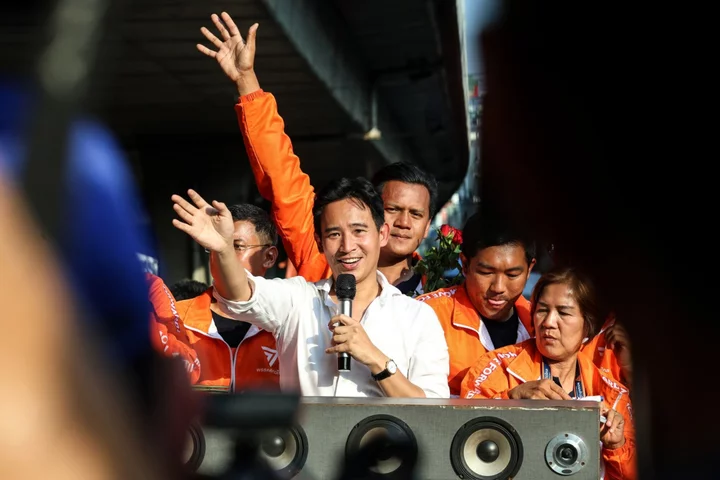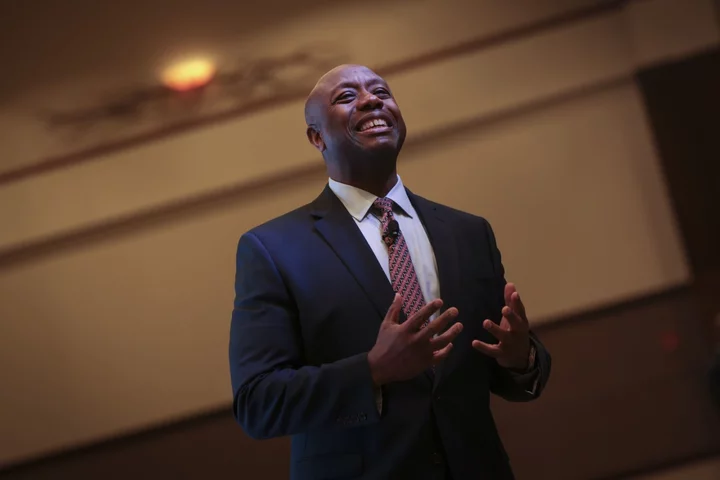Thailand’s pro-democracy parties signed a pact that outlines their common objectives in forming a government after winning the May 14 election, making no mention of amending the lese majeste law, in a move seen as key to building support for Pita Limjaroenrat to become prime minister.
Move Forward will push to relax the lese majeste or the royal insult law, which punishes criticisms against the king and other members of the royal family, as it promised during the campaign “but it won’t be a pressure for our coalition parties,” Pita said during the briefing Monday where the alliance of eight parties laid out 23 items agreed upon.
“Our objective is to improve the relationship between the monarchy and the people,” Pita, who’s aspiring to be Thailand’s 30th premier, said. The coalition agreed that its unified agenda “will not impact the constitutional monarchy,” according to the group’s statement.
The alliance also pledged to push for charter amendments, reinstate cannabis in the list of narcotics, make military enlistment mandatory except during times of war. The eight parties also vowed to take steps to revitalize the economy, decentralize the budget and dismantle monopolies especially in the liquor industry.
The signing of the agreement comes hours after a lawyer asked the Election Commission earlier on Monday to seek a ruling from the Constitutional Court on whether Move Forward’s call to amend the lese majeste, also known as Article 112, undermines the monarchy. Pita said he isn’t worried about this latest complaint nor with an earlier allegation that he violated election rules by holding shares in a defunct media company.
Move Forward’s pledge to push for revisions to Article 112 has emerged as a key dividing line between different political parties as it tries to cobble together a governing majority with a coalition of eight parties that won 313 seats in the 500-member House of Representatives. Pita said on Monday that his party is leading talks with senators on government formation.
While pro-democracy parties won the election, they face built-in obstacles as the constitution — approved following a military coup in 2014 — allows the unelected 250-member Senate to vote alongside the lower house to pick a new leader. That means Pita’s coalition still falls short of the 376 votes he needs in parliament to become prime minister without counting on Senate support.
Pita’s bid to take the top job has faced opposition from many members of the Senate, stacked with allies of the pro-military establishment of caretaker Prime Minister Prayuth Chan-Ocha and other conservative parties. The Bhumjaithai Party, which finished third with 70 seats, already ruled out support for Pita as prime minister, saying it won’t back a candidate from a party planning to amend Article 112.
The conservative Democrat Party has not begun a discussion on its stance on Pita’s bid to become prime minister but it disagrees with amending the law against royal insults, party spokesman Ramate Rattanachaweng said Monday.
Under Thai law, the Election Commission has 60 days after the vote to release official election results and certify 95% of the lower house seats. The first session of the new parliament must then take place within 15 days. That pushes the timeline to late July.
Move Forward’s secretary-general, Chaithawat Tulathon, said over the weekend that he was confident the party could win over some senators, anticipating then that the pact signed Monday will sway members of the Senate to vote for Pita.
The push to directly change laws affecting the monarchy breaks a longstanding taboo in Thailand, where in years past even the suggestion of disloyalty to the palace has been grounds for the military to stage a coup, leading to successive bouts of deadly street protests that have held back Southeast Asia’s second-biggest economy.
--With assistance from Pathom Sangwongwanich, Cecilia Yap, Suttinee Yuvejwattana and Philip J. Heijmans.
(Recasts with royal insult law in headline and lead)









